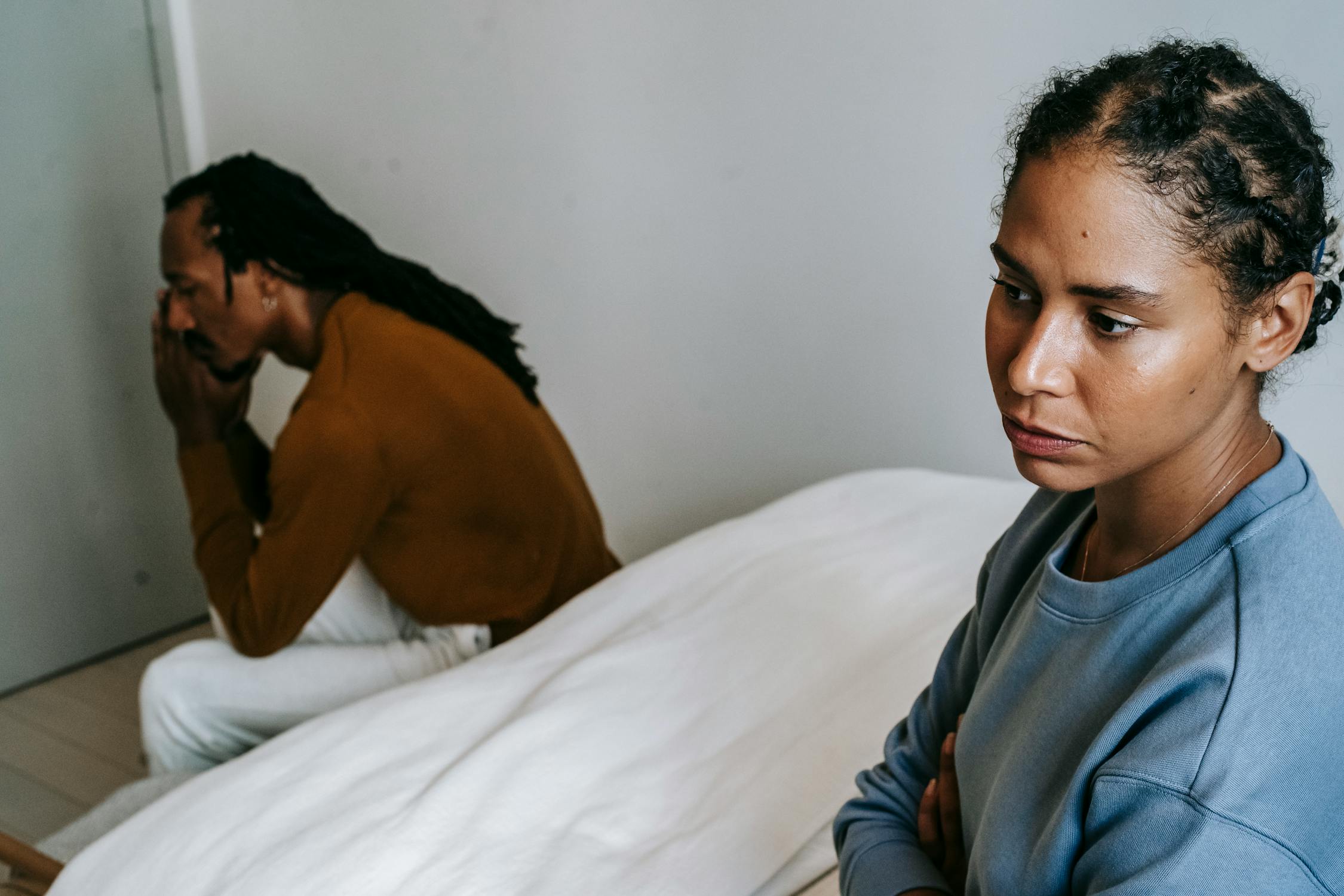
Conflict is an uncomfortable, but necessary part of any relationship. Conflict anxiety holds us back from handling confrontation in a healthy way. We lose out on developing the deeper connections we truly desire.
Read on for how to deal with conflict anxiety to improve your relationships and live a fuller life.
**Disclaimer: This article is based on my own personal experience and opinion and is not meant to be taken as professional advice. Read full disclaimer here.**
What is Conflict Anxiety?
Dealing with conflict is never fun. But for those with conflict anxiety, the fear of confrontation can be debilitating. Being in a conflict, or just the risk of confrontation, triggers intense anxiety. This often leads to avoiding conflict at all costs.
However, conflict anxiety can cause us to respond to confrontation in other unhealthy ways, as well. We may get overly defensive and feel like we’re being wrongly blamed or ‘attacked.’ Or, we use anger and intimidation to deflect from the uncomfortable feelings of our anxiety.
Miriam Kirmayer, therapist and friendship researcher says, “When it comes to conflict, our past experiences, including our interactions with the people closest to us and the behavior that was modeled for us growing up, can impact how comfortable we are expressing our needs and how open we are to hearing someone else out.”
But the more we try to avoid our anxiety, instead of heal it, the more control it has over our lives.
Conflict Anxiety in Relationships
The way we handle conflict can either make or break our relationships. Avoiding confrontation due to conflict anxiety may be easier in the short term, but it is extremely harmful for all our relationships in the long-term.
How Conflict Anxiety Hurts Our Relationships:
- We avoid conflict at all costs – losing out on difficult but necessary conversations
- We suppress our true thoughts and feelings, leading to resentment and misunderstandings
- Our partners can’t know our deeper, authentic selves when we hide who we are to avoid confrontation
- Communication breaks down when conflict can’t be dealt with effectively
- We lose out on new solutions that come by understanding others’ points of view
Conflict is not always a bad thing. If dealt with in a healthy way, it’s key for improving our relationships.

How Conflict Anxiety Affects Your Life
Communication is the foundation of all relationships. Since each person is so unique, conflict will always be inevitable. Whether it’s with our best friend or a coworker, at some point there’s going to be disagreements.
Not knowing how to deal with conflict effectively holds you back in many ways. Strong conflict resolution skills are necessary for career advancement and keeping harmony in the workplace.
People Pleasing
The fear of confrontation may also lead to people pleasing. Where you have trouble saying ‘no’ to others and standing up for yourself. You can’t maintain personal boundaries and it’s easier for people to take advantage of you.
Conflict anxiety may also be tied with social anxiety, making it harder to open up and connect with others. You may be afraid of sharing your true opinions out of fear that others will disagree.
Ready for Change?
There might be many more ways that a fear of confrontation is ruining your life and relationships. But you can decide now to take action and stop letting it hold you back. Read on for tips for how to deal with conflict anxiety.

How to Deal with Conflict Anxiety:
1. Know the Difference: Healthy vs Unhealthy Conflict
To deal with conflict anxiety, first understand the difference between healthy and unhealthy conflict.
Unhealthy Conflict
Unhealthy conflict usually involves physical, emotional, or verbal abuse. This is type of conflict is unproductive. Often, one person tries to control the other through intimidation or manipulation. An example would be a partner who harshly criticizes the other, in an attempt to make them feel more insecure and less likely to leave them.
We all feel insecure from time to time. However, there’s better, healthier ways to feel reassured and communicate our needs.
Signs of Unhealthy Conflict:
- Physical, verbal or emotional abuse
- Avoidance or denial of the conflict
- Angry outbursts
- Blame, gas-lighting, being overly defensive
- Not admitting to or taking responsibility for mistakes
- Having a competitive win/lose mentality – thinking one person is the ‘winner’ or ‘loser’ of the argument
- Lack of empathy for partner’s thoughts and feelings
- Trying to control, trick or manipulate your partner
- Seeking revenge or withholding love etc. as ‘punishment’, a ‘tit for tat’ mentality
On the other hand, healthy conflict is solution-driven. It might get messy sometimes, but ultimately, healthy conflict enhances communication and understanding.
Signs of Healthy Conflict:
- A win-win mentality
- You feel safe to express honest thoughts, feelings, opinions
- Mutual understanding
- Solution-oriented
- Both sides are heard and validated
- Responsibility taken for mistakes made

2. Define Your Fears
Now that you’re clear on the difference between healthy and unhealthy conflict, start by defining your fears. This requires some self-reflection. Ask yourself questions like: What am I really afraid of? What is the worst that can happen? What past memories does this anxiety bring back?
Reflection will help you understand the deeper causes underlying your anxiety. For example, perhaps saying ‘no’ as a child meant guilt trips or verbal abuse from your parents. Now, saying ‘no’ gives you anxiety because it’s associated with these painful memories. You’re afraid of experiencing the same excruciating emotions again.
Identify Your Pain Points
If we don’t clearly define our fears then they become like a faceless phantom. We keep running from them unconsciously without even knowing why. So get clear on what you’re really afraid of. Maybe it’s rejection, criticism, or being misunderstood. Identify your triggers and how they may be linked to past experiences. Once you can see them clearly, you’ll know what you need to work on moving forward.
“Conquering Fear = Defining Fear.” ~ Tim Ferris
Read Related:
10 Powerful Ways Mindfulness Changed My Life
How I Survived Moving Abroad with an Anxiety Disorder

3. Change Your Perspective
Instead of seeing conflict as only a bad thing, remind yourself how it can improve your relationships and communication skills. Focus on the benefits of embracing healthy conflict in your life. It means greater self esteem and stronger personal boundaries.
Challenge old beliefs that you have about conflict. For example, you might think that saying ‘no’ makes you a selfish person. Or that disagreeing with someone is not a ‘nice’ thing to do. Scrap these limiting beliefs and swap them out for new ones. Changing your thinking is crucial for overcoming anxiety. But you must first become aware of all the negative beliefs that are holding you back.
“You won’t change your behavior unless you believe that your current behavior isn’t working. And when you’re nervous or afraid to speak up, it’s easy to convince yourself that staying quiet is the best option.”
Amy Morin, LCSW (psychologytoday.com)
4. Lean Into the Discomfort
Anxiety is caused by our irrational fears. We might have developed these fears from past trauma or negative childhood experiences. But even when we’re able to mentally understand that our fears are not logical, it doesn’t just make them disappear overnight. Our bodies still respond as if our fears are real threats.
But here’s the thing: Don’t wait until you have zero anxiety before changing your behavior. Because if you wait until you feel 100% calm around conflict — you’ll be waiting forever.
Anxiety is overcome by challenging it. You must take the action you want to, even when it doesn’t feel good to, at first. But each time you do, your confidence grows and you realize that your fear was lying to you all along.
Embrace Difficult Feelings
Anxiety is overcome by working through it and moving into action. First, decide on the new behavior that you want to make a habit. For example: You want to say ‘no’ whenever your partner asks you to cancel your plans and meetup with them at the last minute.
Next, commit to this new behavior. Take the new action even when you feel anxious.
Lean into the anxiety by allowing yourself to feel it fully. But don’t judge it, or yourself, for having it. Be mindful of it. Breathe and observe the feeling. Remember that it’s just a feeling. It doesn’t have to control your behavior any longer. You can still act the way you want to. And with time, confronting your fears will gradually diminish your anxiety.

5. Challenge Your Automatic Reactions
Conflict anxiety causes us to react automatically and unconsciously to confrontation in ways that are not healthy – for ourselves or our relationships.
We’re all creatures of habit. But change happens when we stop reacting automatically and consciously make new choices instead.
To change, we must stop these impulsive reactions. For example: You’re in a work meeting and a heated discussion starts. You want to share your opinion, but due to your anxiety, your impulsive response is to remain quiet. Often, this response is so habitual you’re not even aware of it.
Be Aware
Avoiding conflict is not the only way conflict anxiety might manifest.
Let’s say every time you get into a disagreement with your partner, your conflict anxiety is triggered. You feel like you’re being attacked or wrongly blamed due to painful past memories.
Soon, you’re shouting or getting overly defensive for no apparent reason. By just anticipating a confrontation, your body’s flight-or-fight response is switched on and you feel like you’re fighting for your very survival.
To change unwanted, unconscious behavior like this, you have to first be aware of it every time it happens. Notice your triggers and the thoughts/feelings that come up. Be aware of your behavior and how it might not be an accurate reaction to the given situation.
Set a New Intention
Next, set an intention for the new way you want to respond in these situations. Write it out and repeat it to yourself regularly. When you find yourself in the situation, repeat your intention as a reminder to the new, conscious way you want to respond – and commit to doing it.
Examples:
- I calmly explain my opinion whenever someone disagrees with me.
- I listen and acknowledge others’ feedback without taking it personally.
- I make decisions based on what I want, even when others criticize or disapprove.
6. Communicate Your Needs to Your Partner
If you’re in a relationship, your partner’s support can be an important part for how to deal with conflict anxiety. Ask them to support your efforts in overcoming your anxiety and dealing with conflict in a healthier way.
Explain to your partner what triggers your conflict anxiety. The more they are able to understand your behavior, the easier it’ll be to help you work through it. Come up with ways, together, for how you can better communicate during confrontation.
For example, you might explain to your partner that confrontation makes you freeze up and withdraw. Next, ask for ways they can support you when this happens (extra patience, asking questions, drawing out your opinions, etc.).
Closing Thoughts
It can be tough to figure out how to deal with conflict anxiety. But remember that you’re not alone. It’s completely common to feel anxious during confrontation, even when you’re not sure why.
Please note – if your anxiety is severe, trying to treat it on your own may not be best for you. Consider seeing a mental health professional as there are so many benefits to receiving therapy.
There are many ways you can learn to overcome conflict anxiety and start embracing confrontation in a healthy way. It might feel like work at first, but I assure you the benefits will be well worth it.
You’ll gain greater confidence and be able to maintain your personal boundaries. It will enhance your personal relationships. Then, conflict will become an opportunity to learn and growing even closer to those you care about the most.
I hope you enjoyed this article! I’d love to hear from you. Please leave me a comment below about your own experiences with conflict anxiety and what has helped you to overcome it.





Great article! I lost a long time friend due to conflict anxiety. It can be a terrible thing to suffer from. Thanks for sharing.
Thanks for your comment! I know exactly what you mean. I also lost a couple good friends over the years by not having the skills to deal with conflict in a healthy way. It’s a pity, but all we can do is learn from it and move forward.